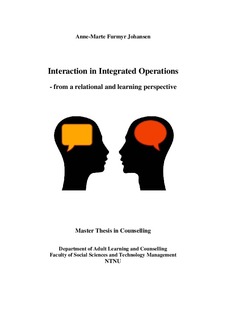Interaction in Integrated Operations: from a relational and learning perspective
Master thesis
Permanent lenke
http://hdl.handle.net/11250/271664Utgivelsesdato
2011Metadata
Vis full innførselSamlinger
Sammendrag
In this thesis I inquire how an interdependent relationship is perceived to affect virtual team member’s interaction and the process of developing knowledge in the team. In order to explore these issues a qualitative case study was conducted and data gathered through the subjective experiences of team members constituting a virtual team in Statoil through the following research question:
How is the interdependent relationship between virtual team members perceived to affect interaction and the process of developing knowledge in the team?
In this thesis an interdependent relationship is understood as team members relating to each other as individuals that are mutually dependent on and responsible for the team’s actions. This interdependent relationship is the fundament for interaction in which team members build on and refine each other’s ideas and knowledge in order to reach their common goals and objectives. Principles from dialogue techniques, by the concepts of perspective making and perspective taking, are elaborated as a means to support interdependent interaction and knowledge creation in the virtual team.
The empirical findings in this particular case study suggest that the informants perceive their interdependent and technologically mediated relationship to represent both challenges and possibilities in relation to their interaction and the process of developing knowledge within the team. Further, acknowledging this interdependent relationship and having the capacity to take the other’s perspective, seems decisive in order to develop shared understanding, complementary knowledge and high-quality decisions in the virtual team. The main findings in this study are:The interdependent relationship between the virtual team members is perceived characterized by involvement, vulnerability, power and shared responsibilityTrust is seen as a vital precondition for interaction between the interdependent virtual team membersDeveloping a shared situational understanding through listening to other’s perspectives seems crucial in order to utilize the potential for developing knowledge in the virtual team
